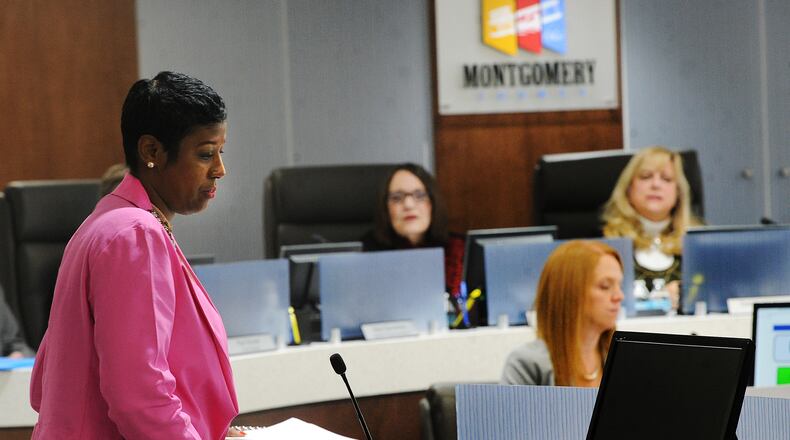Coalition members said the deaths raise questions regarding safety protocols for inmates.
Denise Henton, a coalition member and the fiancé of Blackshear’s cousin, asked commissioners about the amount of jail deaths in the past year, protocol for notification of family or next of kin when an inmate is found unresponsive or deceased, and record-keeping on the treatment of inmates.
Henton also questioned if the sheriff’s office completes its own internal investigations, what the protocol is for jail inmates needing medical treatment and if the recent deaths at the jail are prompting any rethinking of standards related to inmates facing a health crisis.
“We understand that as a community, we all have a role to play in ensuring that jail practices are humane, despite a person’s status of inmate,” she said. “Our coalition represents a vast array of community members from all walks of life who are vested in this work not only because it is the right thing to do, but because many of us have been impacted by the detrimental ripple effect that happens when a loved one is incarcerated.
“Consequently, we are seeking answers, and asking, at minimum, that we evaluate the standard practices in place for the treatment, transparency and accountability for inmates facing health crises at the Montgomery County Jail.”
Montgomery County Commission President Debbie Lieberman told Henton many of her questions would be forwarded to the sheriff’s office for answers.
Lieberman said Dixon and Blackshear’s deaths are “very tragic” and commissioners send their deepest sympathy to their families, but said she could not comment on either one because the commission does not yet know the details of each.
“I don’t have the answers today. We’re working on that,” Lieberman said, referring to the task force county commissioners assembled last month to address mental health and addiction in jails. “Any death in the jail is unacceptable.”
Destiny Brown of Dayton, a jail coalition member for the past six months, said following the meeting that the entire matter remains “in limbo.”
“We’re just waiting to see what the responses will be just because there’s concern around protocol for inmate health and well-being,” Brown said. “No real answers, no real information came today.”
Joel Pruce, a University of Dayton political science professor and a coordinator with the Montgomery County Jail Coalition, said that fundamental to both cases is the fact that both men were being held pretrial, having not been convicted of charges. That, he said, is the case for 50% to 60% of people at the county jail, who are there only because they can’t afford to post bail.
“That’s why, in addition to community-based services for mental health and addictions and such, (we’re seeking) reform of the jail and procedures itself that makes sure that fewer people are there for very simple things, especially misdemeanors, nonviolent crimes, things like that,” Pruce said. “Clearly the jail is a very harmful place to be in ... so to the extent that we can keep people out when they pose no threat to public safety, then that has to be our top priority.”
While a mental health task force is a step in the right direction, “it’s by no means the solution,” he said.
“There are sort of short-term and long-term needs,” Pruce said. “The short-term need is making sure that the dozens of new people that are going to come in today come out alive. I think that’s the least that the sheriff is responsible for is making sure that people are treated humanely, have access to their rights inside to health care and other things, and come out alive.“
About the Author

